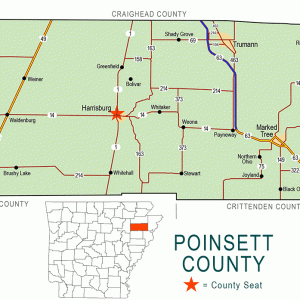calsfoundation@cals.org
Bolivar (Poinsett County)
Bolivar is an example of one of the many small Arkansas towns that briefly rose to local prominence. Located on the slope of Crowley’s Ridge some three miles north of present-day Harrisburg (Poinsett County), the town served as the Poinsett County seat for approximately eighteen years. It never recovered from the removal of the county seat in 1856, followed by the devastation wrought by the Civil War. Today, only a cemetery remains.
At the time of its creation in 1838, Poinsett County was sparsely settled, with no settlements that could be described as towns. The county government temporarily operated out of the home of William Harris, an early settler who served as the first county judge. A commission soon selected a permanent seat of government a few miles north of Harris’s home on the western slope of Crowley’s Ridge. It has been speculated that the name Bolivar was chosen out of respect for the county namesake, Secretary of War Joel Poinsett, and his admiration for South American revolutionary Simón Bolívar. A post office by that name was established in 1839. In the fall of 1838, a contract was let for the construction of a two-story log courthouse. The first floor was occupied by county officials, with the second serving as a courtroom. A jail was also constructed at the base of the ridge. The first session of the court was conducted in the 20′ x 24′ building in September 1839.
Two early roads connected Bolivar to other Arkansas settlements, stimulating its growth and commerce. The Helena, Bolivar and Gainesville Road passed along the western slope of Crowley’s Ridge connecting the small town to the Mississippi River. A second road connected with the river port of Jacksonport (Jackson County).
Before the town’s demise, it was said to have been home to some fourteen stores, a grist mill, a hotel, a saloon, a blacksmith, a lawyer, and a doctor. Among those to open a business was Jewish merchant Z. H. Mook. The town was also home to one of the area’s best horse race tracks.
Baptist and Methodist denominations were established in the town by the 1840s, both originally using the courthouse for services. The Baptist church, which was the county’s first, remained in the town until relocation two miles south of Harrisburg in 1869. A Methodist church, which was built in 1867, was also used by the Masons.
By the 1850s, the survival of Bolivar was threatened by a newly developing town to the south, Harrisburg. As this new town began to increase in importance, there was a push to remove the county government from Bolivar. After a hotly contested vote in 1856, Harrisburg became the county seat. Bolivar’s decline intensified with the closure of the post office the next year. Briefly during the Civil War, the former county seat experienced an increase in activity with the enlistment of many of the local men into the Confederate army. By the end of the war, little of the town remained. Many who had left during the war did not return, and others left upon the war’s conclusion. The Pleasant Valley United Methodist Church was founded near the town in 1892, but the congregation moved by 1925. The school, which had originally been housed in the courthouse, remained open until 1948. By that time, all that remained were a few homesteads; all businesses had ceased to operate. The only reminder of the town today is the ten-acre Bolivar Cemetery.
For additional information:
Biographical and Historical Memoirs of Eastern Arkansas. Chicago: Goodspeed Publishing Co., 1890.
Poinsett County, Arkansas: History and Families. Paducah, KY: Turner Publishing Company, 1998.
Mike Polston
CALS Encyclopedia of Arkansas





Comments
No comments on this entry yet.